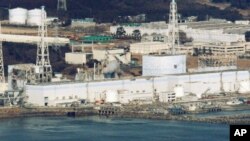Japanese engineers are racing Friday to extend an emergency power cable to a nuclear reactor complex crippled by the country's earthquake and tsunami a week ago.
A steady supply of power could enable workers at the Fukushima plant to get water pumps working again in their urgent effort to cool off overheated nuclear fuel rods.
The International Atomic Energy Agency says that Japanese authorities have told them they have been able to lay a cable line to reactor number two at the nuclear plant. However, it is not clear how close workers are to actually restoring power.
The U.N. nuclear agency reported the situation at the Fukushima nuclear station was "very serious" Thursday, but that the problems caused by last week's natural disaster had not become significantly worse during the previous 24 hours. That assessment was delivered before the announcement late Thursday night that the circuit delivering electric power to the plant had just been restored.
In Vienna, an official at the International Atomic Energy Agency, Graham Andrew, told reporters radiation levels had risen "significantly" in some locations up to 30 kilometers away from the Fukushima plant. However, in Tokyo, 240 kilometers away, radiation levels have been well below levels considered dangerous to human health.
In Washington, top U.S. military officials at the Pentagon said they are sending a nine-member team of experts to evaluate how the U.S. can help Japan deal with its nuclear crisis.
The risk of radiation poisoning has already forced the evacuation of more than 200,000 people who lived within 20 kilometers of the reactor site. Many are in makeshift shelters, with inadequate food, water and other supplies, in frigid winter weather.
For anyone still living inside a wider radius from the plant - 30 kilometers - Japanese authorities said everyone should remain indoors and take measures to minimize the amount of outside air entering their living quarters.
And Japan's Kyodo news agency reported late Thursday that a new government directive would instruct local officials to begin testing for radioactivity in domestically produced food.
Japanese authorities have promoted the idea that a restored water-pumping system can ease overheating at the reactors, but the government's chief spokesman, Yukio Edano, warned that even then, seawater has corroded much of the original pump system and it will have to be replaced.
Three of the Fukushima plant's six reactors were operating when the quake struck, while three others were shut down for maintenance. Explosions have rocked all three of the three units that had been in operation, causing varying degrees of damage to the elaborate systems meant to contain the reactor's core material and prevent a runaway nuclear reaction.
With those fears in mind, the Japanese military used high-pressure fire hoses early Thursday in a desperate attempt to douse nuclear fuel rods that have been overheating since the March 11 earthquake disabled the 40-year-old nuclear plant's cooling systems. If the rods become hot enough, the greatest danger is that they could melt or burn through their outer casings, which would greatly increase the amount of radiation released into the atmosphere.
Japan also used aerial water drops from helicopters, but video of the operation showed most of the water fell far from the reactors' cooling tanks, and the effort was suspended after four attempts.
Extremely high radiation levels in the near vicinity of the reactors have made it impossible for workers to approach the facility for more than a few minutes at a time.
Greg Jaczko, head of the US Nuclear Regulatory Commission, said Thursday it would be a "prudent measure" for its citizens to follow US government advice to stay at least 80 kilometers from the plant -- a radius much larger than the Japanese exclusion zone. He described the situation at the Fukushima plant as "very dynamic."
Many governments are evacuating staff from embassies in Tokyo. The United States has authorized the evacuation of family members and dependents of U.S. personnel, and promised, Thursday, that charter flights will be provide to help any Americans who want to leave Japan.
The prime minister's office warned of a "massive power outage" in the area served by the Tokyo Electric Power Company, TEPCO, and called on everyone in the country to conserve electricity.
Some information for this report provided by AFP, AP and Reuters.




